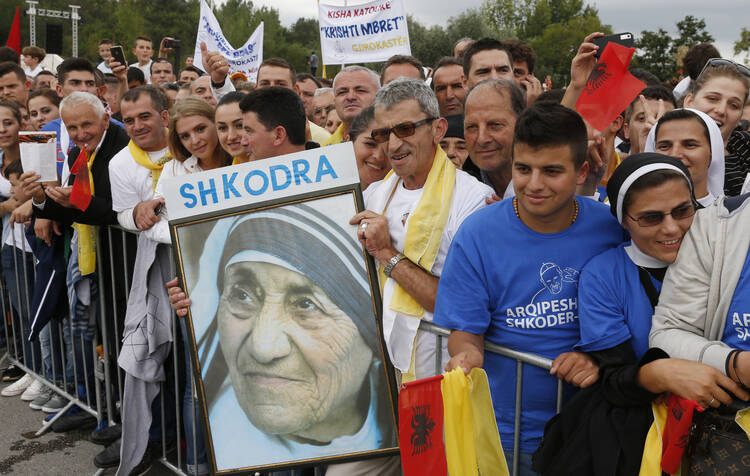We live in a world where light and darkness coexist. Through the life she lived, Mother Teresa invited people to choose light. In this way she opened a road to holiness for many others. So we shall be numerous, in Saint Peter’s Square on Oct. 19, rejoicing that Pope John Paul II, by declaring her blessed, proposes her as a model to believers.
Mother Teresa made words written by St. Augustine four centuries after Christ comprehensible to us: Love, and say it with your life. Trust in God becomes credible and is communicated above all when it is lived out.
I had many opportunities to converse with Mother Teresa. Often it was possible to discern in her reflections of the holiness of Christ.
In the summer of 1976 she came to Taizé. Our hill was full of young people from many different countries. That day we wrote a prayer together: O God, Father of every human being, you ask us all to bring love where the poor are humiliated, reconciliation where human beings are divided, joy where the Church is shaken. You open this road for us so that we may be ferments of communion throughout the entire human family.
That same year, a few of my brothers and I went to live for a time with the very poor in Calcutta. We were staying near Mother Teresa’s home in a lower-class district, noisy, full of children, where mostly Muslims lived. We were offered hospitality by a Christian family whose home was in front of an intersection of some small streets, filled with shops and simple workshops. Mother Teresa often came to pray with us. In the afternoon, she sometimes asked me to go with her to visit lepers who had nothing to look forward to but death. She tried to calm their worries.
Sometimes she could take initiatives that were quite spontaneous. One day, on the way back from visiting the lepers, she said to me in the car, I have something to ask you. Say yes! Before giving my reply, I tried to find out more about what she wanted, but she would only repeat, Say yes!
Finally she explained. Tell me that from now on you will wear your white robe all day long; this sign is so necessary in the situations of today.
Yes, I answered; I will speak to my brothers, and I will wear it as often as possible. So she had the sisters make a white robe for me and insisted on sewing part of it herself.
She was particularly attentive to children. She proposed that one of my brothers, who was a physician, and I go to the home for abandoned children every morning to take care of those who were most ill. On the first day I discovered a little girl, four months old. I was told that she did not have enough strength to resist the viruses of the winter. And Mother Teresa proposed, Bring her with you to Taizé; you will be able to take care of her there.
In the plane returning to France, the little girl, named Marie, was not well. When we arrived in Taizé, she began to gurgle like a happy baby for the first time. In the first weeks, she often slept in my arms while I worked. Slowly her strength returned. Then she went to live in the village, in a house close to ours. My sister Genevieve, who years before in Taizé had taken in children and raised them as her own, welcomed her to her home. When she was baptized I became her godfather, and I love her like a father.
Several years later, Mother Teresa came back to Taizé one Sunday in the autumn. During the prayer, together we expressed a concern that remains true today: In Calcutta, there are visible homes for the dying. But in many parts of the world, many young people are in invisible homes for the dying. They are marked by broken relationships or by worry for their future. Separations have wounded in them the innocence of childhood or adolescence. In some this leads to disenchantment: What is the good of existing? Does life still have any meaning?
In 1984 Mother Teresa and I were invited by the Holy See for the opening of the first World Youth Day in Rome. We had to speak in the Coliseum, one after the other. Little Marie, who was eight years old, was there too. The wind of early spring was blowing so strongly that I had to hold her tightly wrapped in her cape so that she would not be pierced by the cold. She was very quiet. With her keen and attentive mind, she wanted to listen to everything.
Later on, we were invited once again to lead a prayer for World Youth Day, this time in Denver, in the United States. But Mother Teresa was already ill. When I arrived, I learned that she had had to cancel her trip. She sent me a letter to tell me: Let’s write a fourth book together!
Two of my brothers and I went to Calcutta in order to take part in Mother Teresa’s funeral. We wished to thank God for the gift of her life and to sing with her sisters in the spirit of praise. Next to her body, I remembered how we had in common this conviction: a communion in God stimulates us to alleviate human suffering on earth. Yes, when we soothe the trials of others, we encounter Christ. Does he not say it himself, Whatever you do for the least, you do for me?








